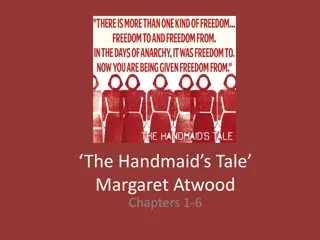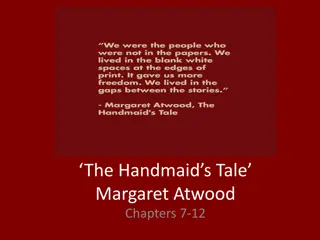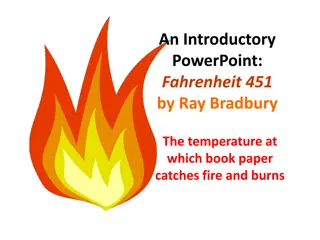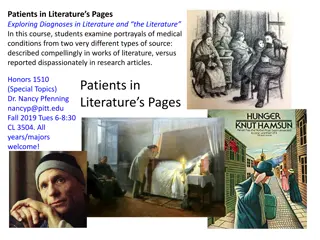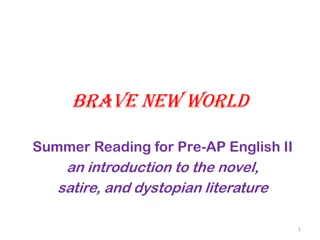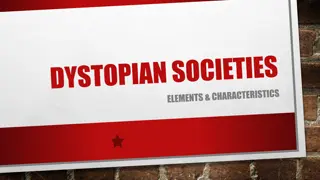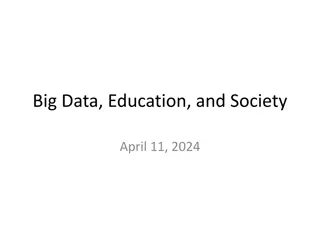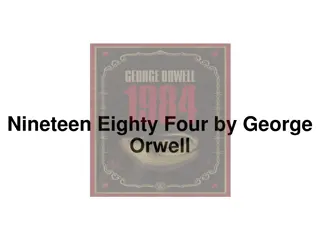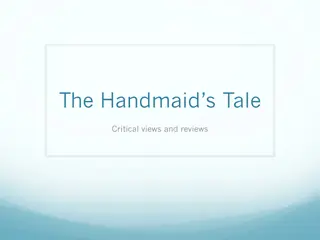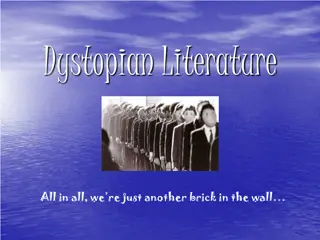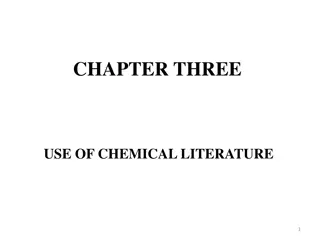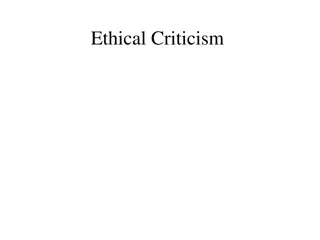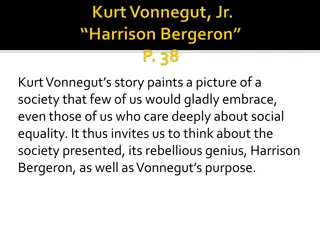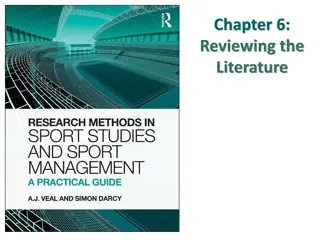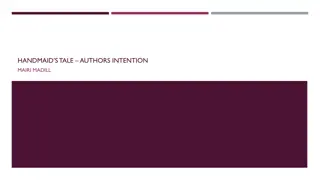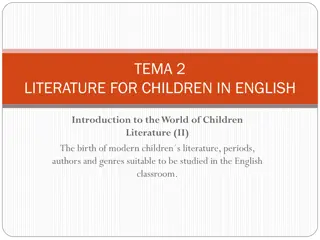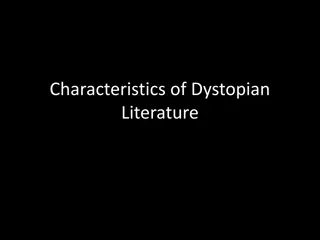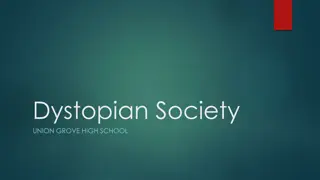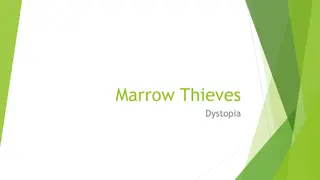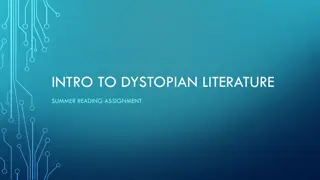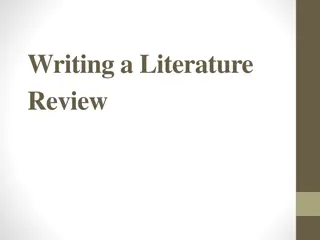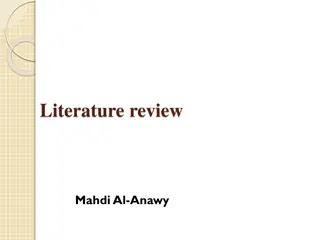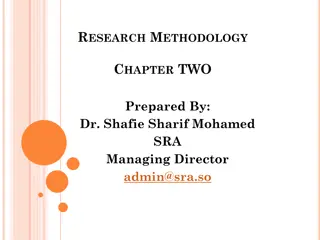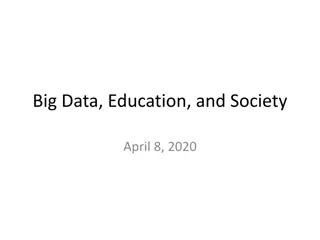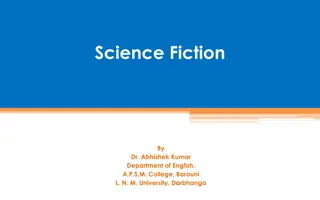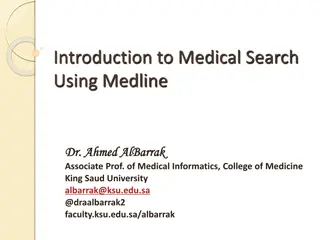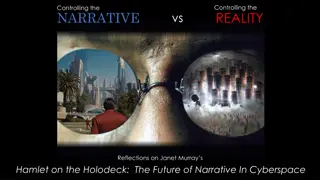Importance of literature review
A literature review is a critical component of any research endeavor, providing a comprehensive analysis of existing knowledge in a particular field. This review helps in clarifying conceptual issues, understanding research design, persuading examiners, and contributing new insights to the subject a
0 views • 28 slides
[PDF⚡READ❤ONLINE] In Ruins: A Journey Through History, Art, and Literature
\"COPY LINK HERE ; https:\/\/getpdf.readbooks.link\/1400030862\n\n[PDF READ ONLINE] In Ruins: A Journey Through History, Art, and Literature | In Ruins: A Journey Through History, Art, and Literature\n\"\n
1 views • 6 slides
Obscenity, Literature & Law
Delve into the interplay between obscenity, literature, and law, tracing the history of censorship in English law, landmark cases like the Lady Chatterley Trial, and the contemporary landscape of obscenity in legal frameworks. Discover the nuances of freedom of expression, diverse authorship in lite
0 views • 25 slides
Effective Strategies for Literature Searches and Re-Use of Scholarly Literature
Conducting literature searches involves surveying existing publications and information on a specific topic. Different search strategies, from simple searches to systematic queries and snowballing, are utilized based on research needs. Learning objectives include building search strategies, using ad
3 views • 19 slides
Introduction to Isixhosa Language and Literature - Exploring Characters and Themes
This content provides an overview of Isixhosa as a first additional language (FAL) and delves into key aspects of literature such as character development and themes. It discusses the importance of characters in storytelling, emphasizing the significance of round and flat characters. The article als
3 views • 28 slides
Understanding Dystopian Societies in 1984 Novel Guide
Explore the themes of utopia and dystopia in George Orwell's 1984 novel through a comprehensive guide. Learn about the characteristics of dystopian societies, types of controls, and the role of protagonists in challenging oppressive systems. Dive into the discussions on propaganda, surveillance, deh
0 views • 10 slides
Comprehensive Literature Review Guidelines for Your Dissertation
Discover expert guidelines for conducting a thorough literature review in your dissertation. Explore topics such as literature search strategies, theoretical frameworks, review of the literature, synthesis, and analysis, with actionable tips provided throughout.
0 views • 11 slides
Insights into "The Handmaid's Tale" Chapters 1-6 Analysis
Within the first six chapters of "The Handmaid's Tale" by Margaret Atwood, we are introduced to the narrator, Offred, and gain a detailed understanding of the life and role of a Handmaid in the dystopian society of Gilead. Key quotes and epigraphs shed light on the themes of fertility, desperation,
0 views • 20 slides
Understanding Offred's Journey in "The Handmaid's Tale" through Chapters 7-12
Offred's experiences in chapters 7-12 of "The Handmaid's Tale" reveal the depth of her depersonalization and loss of identity in the dystopian society of Gilead. Through key quotes, we delve into Offred's reflections on her body and the control imposed upon her, shedding light on her feelings toward
0 views • 12 slides
Exploring the Significance of Persian Language and Literature in Indian History
Persian language and literature hold a crucial place in Indian history, serving as a prime source for understanding the medieval period. Scholars in India have dedicated their lives to preserving and promoting Persian history, language, and literature. The rich cultural heritage of India, dating bac
0 views • 9 slides
Mastering the Literature Review Process
Understanding the significance of literature review, this guide emphasizes the essential steps involved in conducting a successful literature review - from planning and research problem identification to critical analysis and contribution to existing literature. It explains the importance of develop
0 views • 16 slides
Effective Strategies for Conducting Business Research Literature Review
This literature review provides insights into conducting business research effectively, covering topics such as how to search, read, and write literature reviews, along with the goals and types of literature. It emphasizes the importance of generating research ideas, demonstrating knowledge, and int
1 views • 13 slides
Insights into Fahrenheit 451 by Ray Bradbury
Explore the influential novel Fahrenheit 451 by Ray Bradbury, delving into its origins, themes, and relevance in the context of societal criticism, dystopian elements, and historical backdrop of the 1950s. Discover the cautionary tale of censorship, technological advancements, and the impact of tota
0 views • 16 slides
Exploring Diagnoses in Literature and the Literature
This course delves into portrayals of medical conditions in literature versus research articles. It explores the intersection of science and literature, analyzing works like "Black Swan Green" and "The Reason I Jump" to understand how they depict conditions like stuttering and autism. Through studen
1 views • 28 slides
Evolving Perspectives on Literature and Translation
Explore the intertwined relationship between national literature, comparative literature, and world literature, delving into the evolution of translation studies. Reflect on the shift from national literary histories to world histories of literature, highlighting the significance of world literature
3 views • 54 slides
Exploring "Brave New World": An Introduction to Dystopian Satire
This guide provides an overview of Aldous Huxley's "Brave New World," discussing its themes of propaganda, censorship, conformity, genetic engineering, and social conditioning. Delve into the novel's depiction of a controlled society, the use of technology, consumerism, and the satire employed to cr
1 views • 15 slides
Understanding Utopia and Dystopia in Literature and History
Explore the concepts of Utopia and Dystopia, with a focus on their definitions, examples, and the role of dystopian literature in critiquing societal norms and systems. Discover the historical circumstances that have influenced the flourishing of dystopian fiction, along with the various types of dy
0 views • 11 slides
Exploring Big Data's Impact on Education And Society
This presentation delves into the intersection of big data, education, and society, highlighting the risks and challenges involved. It also discusses privacy issues and the perception of malevolence in data collection. Examining a research trial involving Galvanic Skin Response bracelets in classroo
0 views • 44 slides
Insights into George Orwell's Nineteen Eighty-Four and Totalitarian Regimes
George Orwell's novel Nineteen Eighty-Four explores themes of oppression, totalitarianism, and political satire inspired by the oppressive regimes of Nazi Germany and Soviet Russia. The story delves into a dystopian society controlled by the Party, led by figures like Big Brother, reflecting Orwell'
1 views • 25 slides
Critical Views and Reviews of "The Handmaid's Tale" Through Feminist and Utopian Perspectives
The critical exploration of "The Handmaid's Tale" delves into themes of feminism, utopianism, and dystopian dangers. It discusses the portrayal of education, the impact of digitization, and the feminist utopias created by Margaret Atwood. The novel is commended for its reflection of societal issues
0 views • 21 slides
Understanding Dystopian Societies: A Comprehensive Overview
Explore the intricate realms of dystopian literature, delving into the contrasting notions of utopia and dystopia. Uncover the defining characteristics of dystopian societies, from oppressive controls to societal illusions. Dive into the various types of dystopian controls, including corporate, bure
0 views • 25 slides
Understanding the Importance of Chemical Literature in Research
Reviewing chemical literature is essential in the research process to identify existing knowledge, develop hypotheses, plan methodologies, and discover unanswered questions. The vast and complex nature of chemical literature poses challenges in finding relevant information, especially with evolving
0 views • 22 slides
Exploring Ethical Criticism and Literature's Human Possibilities
Ethical criticism in literary studies revolves around the intersection of ethics, literature, and criticism. It tackles concerns about the relationship between value judgments, ethics, and aesthetics, emphasizing the importance of reconnecting criticism with moral principles. Literature offers a dee
0 views • 21 slides
Exploring Themes in Kurt Vonnegut's "Harrison Bergeron
Kurt Vonnegut's story "Harrison Bergeron" presents a dystopian society obsessed with enforced equality. Through the rebellious character of Harrison and thought-provoking narrative, Vonnegut challenges readers to reflect on the consequences of extreme sameness and the value of individuality, freedom
0 views • 8 slides
Understanding the Importance of Literature Review in Research
Exploring the roles of literature in research, this content emphasizes the significance of reviewing existing literature to gather ideas, compare methodologies, and integrate supportive information. It also highlights the types of reviews and essential questions to consider during the literature rev
0 views • 12 slides
The Status of Literature in Secondary Schools of the O.E.C.S. - Research Findings by Dr. Anthony Felicien
Research by Dr. Anthony Felicien examines the status of literature in secondary schools of the O.E.C.S., focusing on the decline of interest in literature among students, influenced by historical curriculum changes and parental attitudes. The study highlights the importance of studying literature fo
0 views • 35 slides
Feminism in "The Handmaid's Tale": Exploring Authorial Intentions
Despite Margaret Atwood's denial of writing "The Handmaid's Tale" as a feminist piece, the novel inherently explores feminist themes through the portrayal of women's oppression and control in a dystopian society. The text delves into the objectification of women, their limited autonomy, and the supp
0 views • 8 slides
Evolution of Children's Literature in English: From Alice to Modern Times
Explore the birth of modern children's literature starting with the publication of "Alice's Adventures in Wonderland" in 1865 by Charles Dodgson (Lewis Carrol), marking a shift towards entertaining and engaging literature specifically for children. Prior to this, children mainly read folklore and ad
0 views • 35 slides
Understanding Dystopian Literature: Key Characteristics and Examples
Explore the characteristics of dystopian literature, including societal control, propaganda, surveillance, dehumanization, and the worship of figures or concepts. Learn how dystopias critique current trends and political systems through imagined oppressive worlds. Discover examples from popular dyst
0 views • 17 slides
Understanding Dystopian Societies and Controls
Dystopian societies, like Union Grove High School, exaggerate worst-case scenarios to criticize current trends or systems. Characteristics include propaganda, restricted freedom, and banished natural world. Types of control include corporate, bureaucratic, technological, philosophical, or religious.
0 views • 11 slides
Exploring Dystopian Worlds in Literature
Marrow Thieves presents a dystopian universe where societal control is oppressive. Dystopias criticize current trends by exaggerating worst-case scenarios. Characteristics include propaganda, limited freedom, and dehumanization. Types of control range from corporate to technological. Dystopian prota
0 views • 15 slides
Introduction to Dystopian Literature: Summer Reading Exploration
Explore the origins of utopia and its transition to dystopia in American society through a critical analysis of dystopian characteristics and control mechanisms. Discover how propaganda, surveillance, and societal oppression are depicted in dystopian literature, challenging readers to question socie
0 views • 9 slides
Mastering the Art of Writing Literature Reviews
Understanding the essence of a literature review, its descriptive and analytical components, selecting key articles, and finding relevant sources are essential steps in crafting a comprehensive literature review. By integrating ideas from various sources and highlighting crucial findings, a literatu
0 views • 18 slides
Comprehensive Guide to Literature Review Process
A literature review is essential before conducting research to identify existing information, gaps in literature, major works, and relationships between studies and theories. Follow steps such as defining the topic, sourcing information, discussing findings, and drafting to write an effective litera
0 views • 8 slides
Effective Strategies for Conducting a Literature Review in Research Methodology
Understanding the importance of literature review in research methodology, this chapter discusses the objectives, aims, and guidelines for writing a comprehensive literature review. It emphasizes the significance of identifying gaps in existing knowledge, structuring the review, and organizing infor
0 views • 33 slides
GCSE English Language and Literature Overview
GCSE English Language and Literature subjects are led by Mrs. A. Baker and Mr. Doodson. English Language is examined by OCR, while English Literature is examined by Edexcel. Both subjects have two examination papers worth 100% of the grade. English Language papers focus on reading and writing skills
0 views • 14 slides
Privacy Concerns Surrounding Galvanic Skin Response Bracelets in Education
The use of Galvanic Skin Response (GSR) bracelets in classrooms to measure physiological engagement has raised privacy concerns. Critics fear a dystopian future where students and teachers are monitored and controlled through electronic devices, leading to questions about common sense, funding sourc
1 views • 35 slides
Evolution of Science Fiction Literature
Science fiction genre, blending imaginative fantasy with scientific principles, has evolved significantly over time. Initially emerging in the late 1800s, it gained popularity alongside technological advancements. Theodore Sturgeon highlighted the essence of human stories within the genre. Iconic wo
0 views • 8 slides
Effective Medical Literature Search Techniques by Dr. Ahmed AlBarrak
Dr. Ahmed AlBarrak, an Associate Prof. of Medical Informatics at King Saud University, provides valuable insights on medical literature search using resources like Medline. The content covers objectives of literature search, methods to find relevant literature, advantages of electronic journals, and
0 views • 39 slides
Exploring Janet Murray's Vision of Narrative Evolution in Cyberspace
Janet Murray's book "Hamlet on the Holodeck: The Future of Narrative In Cyberspace" delves into the shift towards interactive storytelling in modern media like video games and Virtual Reality. She emphasizes the role of interactivity, immersion, and freedom in shaping narratives, offering a new form
0 views • 16 slides
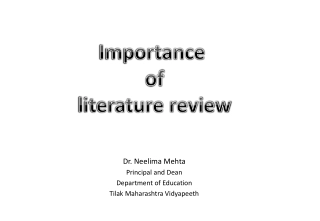
![[PDF⚡READ❤ONLINE] In Ruins: A Journey Through History, Art, and Literature](/thumb/20543/pdf-read-online-in-ruins-a-journey-through-history-art-and-literature.jpg)





